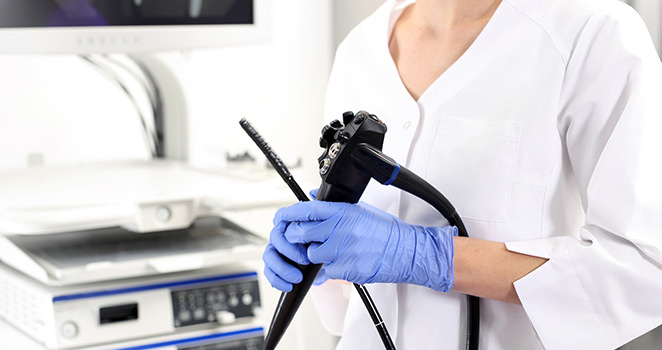Endoscopies in Outpatient Surgery

Endoscopies In Outpatient Surgery
Endoscopies have been used in outpatient surgery for the last 70 years. During this procedure, small scope is inserted into the body through a natural opening like the mouth and anus, or through small surgical incisions.
Why are Endoscopies Performed?
- Endoscopies have a number of uses, including:
- Investigate physical symptoms to find their root cause.
- Diagnose various conditions through collecting small tissue samples.
- Treat various conditions using small tools that fit through the endoscope.
Most patients are familiar with a couple very common endoscopic procedures.
Upper Endoscopy
With an upper endoscopy, also known as an EGD, an endoscope is inserted through the mouth and passes through the esophagus, into the stomach, and into the upper portion of the large intestine. These are often performed to help identify cause of issues like abdominal or chest pain, heartburn, bleeding, and swallowing problems.
They can also be used to help identify and treat inflammation, ulcers, and tumors. Upper endoscopy is also very useful when a foreign object is swallowed and needs to be recovered to prevent further harm to the patient.
Colonoscopy
In a colonoscopy, an endoscopy is inserted into the rectum and fed through the lower gastrointestinal tract, including the small intestine. This particular procedure is commonplace for patients over 50, or those who have a family history of colon cancer. During this procedure, the surgeon will look for polyps and signs of colorectal cancer. If polyps are found, they will often be removed and sent to a lab for further examination to determine if they are precancerous, cancerous, or benign.
Who Conducts an Endoscopy
Board certified general surgeons could perform most endoscopic procedures. Some very specific procedures may require a gastroenterologist. Your physician will guide you as to who is best equipped to handle your endoscopic procedure.
Due to their minimally invasive nature, most endoscopic procedures can be conducted on an outpatient basis, with many day surgery centers offering a wide range of endoscopy. This ensures that patients spend the least amount of time possible in the hospital environment, thereby aiding in the recovery process.
What Should You Expect From an Out-Patient Endoscopy?
The preparation for an out-patient endoscopy begins the night before. In most cases, you will not be allowed to eat anything beyond about midnight the night immediately before your procedure. In the case of colonoscopies, you may have a restricted diet earlier in the day preceding your procedure, and be asked to drink a preparatory solution that will help to clean out your digestive tract.
You will be asked to arrive to the surgical center the day of your procedure, and will then be seen by the anesthesia team. Even if you are not undergoing general anesthesia, this specialty team will monitor you during your procedure to ensure your body is responding well to the medications being administered.
There are several medications that you may be given, from sedatives to local anesthetics, depending on the type of procedure being performed. Some patients remain conscious during this procedure while sedated. Others fall asleep during the procedure because of the sedative. In most cases, patients do not remember the procedure due to the sedative administered.
Air may be pumped into your digestive tract to allow the surgeon to more easily see and perform any diagnostic or reparative procedures.
After your procedure, you will be monitored for a short time. This is to ensure your body is responding well to coming off the sedative medications. In most cases, the post-op team will want to see you passing gas prior to being discharged to ensure there are no signs of complications.
What Are The Risks With Endoscopic Procedures?
As with any surgical procedures, there are some risks with endoscopic surgery, though these risk are very low due to their minimally invasive nature. These risks include:
- Negative reactions to the sedation
- Infection
- Bleeding
- Perforation of the gastrointestinal tract
While the risks for each of these are small, it is important to understand their symptoms. Be sure to review your discharge information closely with your post-op team to understand what you should watch for as signs of any complications.
Endoscopic procedures are very common and can help solve a number of different problems. Be sure to discuss your options for endoscopy with your physician if you believe there is an issue with your digestive tract.